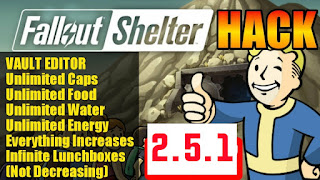Fallout Shelter is the first mobile game from desktop and console giant Bethesda Softworks, of fame primarily for their work on the Elder Scrolls and Fallout franchises. Bethesda is no stranger to success, and the titles developed by their in-house division (Bethesda Game Studios) have generally been smash hits. The Elder Scrolls III: Morrowind, Fallout 3, The Elder Scrolls IV: Oblivion, and The Elder Scrolls V: Skyrim were all highly successful games, and the upcoming Fallout 4 already has fans hugely excited for the next installment of the modernized post-nuclear role-playing phenomenon.
Fallout Shelter is, essentially, a tease for this game. It's about giving fans of the franchise (and new players, of course) a little handout to say, "Hey, thanks for liking Fallout, maybe pre-order Fallout 4 ???" And that's what makes Fallout Shelter so likeable - in principle. To get to the point: at no junction does this game demand you spend any money at all. It's not even encouraged. And that's because this game is a marketing tool - it's just about promoting the brand. Can you spend money in Fallout Shelter? Sure. But doing that to the tune of more than $5-10 would kind of be like buying an entire set of collectible trading cards, or getting to skip every line in an amusement park. Sure, it might be fun initially, but it would actually make things worse by the time all was said and done. It would take away from the magic, the joy of the game, of patience rewarded.
Most free-to-play games understand this quite well [and abuse it like an offshore corporate tax haven]. No matter how much money you throw at them, they're generally quite happy to let you get to a point where you're going to want or need more. Those are the mechanics of the business - you have to keep players coming back. Fallout Shelter is, oddly, quite the opposite. Initially, you might want to spend a few dollars just to jump-start your vault (more on the mechanics later), but once you're at a population of 100+ and everybody's got a gun and outfit to equip, spending real money makes even less sense. And that's actually the game's primary drawback - there is very little to keep you coming back after a couple weeks of consistent play. I'm personally pretty much over it at this point. But let's not get ahead of ourselves.
Inside these rooms, you place your vault dwellers, grabbing them Roller Coaster Tycoon style and plucking them up and setting them down where you'd like them to go. What happens in the rooms? Things! Let's explain the basic mechanics.
The first mechanic to know is resources. You have power (electricity), water, and food. Those are your necessities. You have a baseline requirement for each of these resources, and you gather them by building rooms that generate them. If you have insufficient power, some of your other rooms will stop functioning. If you have insufficient water or food, your vault dwellers will start losing health over time. The only reason I can tell that water and food are separate resources is that Bethesda felt like there needed to be three things to "balance" production of. You also have caps, which are the currency you use to build and upgrade rooms.
Bethesda lays a pretty cut-and-dry groundwork for a game here, and I think that's intentional. By making the basic mechanics quite easy to understand, Fallout Shelter is a more approachable and friendly game than the sort of thing Bethesda typically makes. It's casual.
The depth comes in the form of learning how to expand your vault effectively without overstretching your resources or underdeveloping your vault dwellers. So let's talk about those.
As in the Fallout games of yore, your vault dwellers have something called their "S.P.E.C.I.A.L." stats. Those, in order, stand for Strength, Perception, Endurance, Charisma, Intelligence, Agility, and Luck. They are the quintessential RPG character stats. Each dweller is born with pretty boring stats, and they also start at level one, so there is a leveling system, too. Leveling does not increase your SPECIAL stats. Instead, leveling only increases a dweller's hit points, and leveling is achieved by either working in a production room in the vault (making power, food, water, nuka-cola, stimpaks, or rad-away) or exploring the wasteland.
The purpose of the SPECIAL stats is in increasing the effectiveness of your dwellers at particular tasks. Want Johnny Nuclear to be better at running the power generator? Send him to the strength training room for a day. Once his strength is at the level you want, send him back to the generator room. Fallout Shelter doesn't just use these as a way to boost the output of resources from these rooms by quantity, but instead in terms of how long it takes the room to spawn new resources. Resources are managed in terms of an absolute quantity, but because they're consumed over time, Fallout Shelter doesn't want you building a ton of power rooms, hoarding a bunch of power, then destroying them so you can make more useful training areas or food production and otherwise attempt to game the system in some way. So, if you have a Level 3 Power Generator (each resource room can be upgraded twice to increase its production and the maximum amount of the resource you may store) that creates 40 power every time it "pops," increasing the combined Strength trait of dwellers working in that room from 10 to, say, 15, will decrease the amount of time between "pops." So you'll get 40 power every 90 seconds instead of every 120. Got it? It's a lot simpler in practice to understand than it is to write it out, trust me.
Mod Features:
Subscribe to Unlock
<









No comments